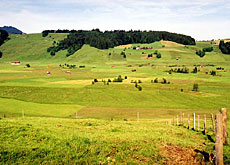Switzerland urged to do more for environment

Switzerland's track record in the environment is second to none but it still has a long way to go, says the Organisation for Economic Cooperation and Development (OECD).
On World Environment Day, the international body told Switzerland it needed to encourage biodiversity and improve water quality.
The OECD congratulated Swiss authorities on achieving many of the goals they had set themselves over the last three decades.
In its “Environmental Performance Review”, which looked at 32 countries from 1993 to 2000, the organisation also ranked air quality in Switzerland among the best in the OECD zone.
Similarly, Switzerland was placed ahead of other countries when it came to recycling waste.
But, the Swiss scored low marks when it came to water resources, because of the problem of some persistent pollutants.
Biodiversity
The finding was confirmed by Christiane Maillefer of the Swiss-based environmental organisation, WWF, who said the problem of nitrates in Swiss water had yet to be tackled.
Maillefer also concurred with the OECD in criticising Switzerland’s poor track record when came to encouraging biodiversity.
“The percentage of rare, endangered or extinct plant and animal species in Switzerland are among the highest in the OECD zone,” said its report.
The director of the Swiss Environment Agency (SEA), Philippe Roch, said urban development was to blame.
“Nature has been pushed to the sidelines because of population density and infrastructures,” he told swissinfo. “So species which need large spaces are under threat.”
But Roch told swissinfo he was optimistic that things could only get better thanks to Switzerland’s new domestic agricultural policy which would create zones favourable to biodiversity.
Federalism
Swiss federalism also came under fire. This system of governing meant that federal environmental policy was not always being implemented uniformely by the cantons and communes, said the OECD.
At the local level, this meant that there was a tendency “to put short-term development or urbanisation projects ahead of protecting nature.”
“Federalism slows down the entire process and prevents rapid and clear decision-making,” Roch explained.
Globalisation fallout
This week, the SEA also called for a more coherent global environmental policy in order to safeguard the world’s resources and future economic development.
On World Environment Day, the organisation also criticised G-8 leaders meeting near Lake Geneva this week for failing to tackle environmental issues.
Roch said polluters should pay for damage their industry causes to the environment, while production and consumption should become more compatible with the planet’s ecological capacity.
“Nature has had to evolve and diversify over the millennia in order to survive and globalisation should now do the same if the planet is to survive,” he said.
“There will be no economic development in the long-term if we do not develop a coherent environmental policy.”
Targets
The SEA has set out key areas needed to bring economic development in line with the environment.
Roch explained that the main goal being pursued by Switzerland was for the World Trade Organization to define, by the end of 2004, the relationship between trade regulations and multilateral environmental agreements.
Conventions regarding chemicals need to be adopted, while implementation of the Kyoto Protocol would slow down climate change and conserve biodiversity, Roch said.
swissinfo, Marc-André Miserez and Samantha Tonkin
The OECD report says Switzerland could do more to ensure water quality and protect its endangered species.
The international body believes federalism hinders the even, nationwide implementation of environmental policy.
The OECD has 30 member countries, including Switzerland.
World Environment Day is an annual event organised by the United Nations, which falls on June 5.

In compliance with the JTI standards
More: SWI swissinfo.ch certified by the Journalism Trust Initiative











You can find an overview of ongoing debates with our journalists here . Please join us!
If you want to start a conversation about a topic raised in this article or want to report factual errors, email us at english@swissinfo.ch.